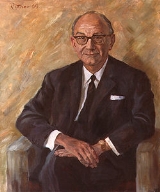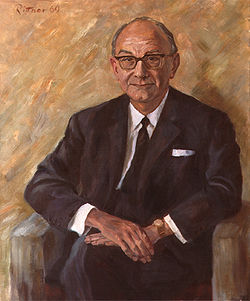
Siegfried Balke
Encyclopedia

Germany
Germany , officially the Federal Republic of Germany , is a federal parliamentary republic in Europe. The country consists of 16 states while the capital and largest city is Berlin. Germany covers an area of 357,021 km2 and has a largely temperate seasonal climate...
politician
Politician
A politician, political leader, or political figure is an individual who is involved in influencing public policy and decision making...
(CSU).
He served as German Federal Minister for Post and Communications from 1953 to 1956 and as German Federal Minister for Nuclear Energy from 1956 to 1962.
Education and Professional Life
Master's degree in chemistry 1924, doctorate in chemistry 1925. During the Nazi period, Balke, a Protestant Christian, was classified as a half-Jew, which prevented him from pursuing an academic career in Germany.From 1925 to 1952, he worked for various chemical companies, until he became director of Wacker Chemie
Wacker Chemie
Wacker Chemie AG is a worldwide operating company in the chemical business, founded 1914. The company is controlled by the Wacker-family holding more than 50 percent of the shares. The corporation is operating more than 25 production sites in Europe, Asia, and the Americas...
in 1952. A 50% stake of Wacker Chamie was held by the chemical conglomerate IG Farben
IG Farben
I.G. Farbenindustrie AG was a German chemical industry conglomerate. Its name is taken from Interessen-Gemeinschaft Farbenindustrie AG . The company was formed in 1925 from a number of major companies that had been working together closely since World War I...
until 1945, and then by Hoechst AG. After 1945, Balke was one of the few executives of the German chemical industry not stained by Nazi collaboration, which led to his chairmanship of the Association of the Bavarian Chemical Industry. He was honorary professor for chemical processing at the Ludwig-Maximilians-University in Munich
Munich
Munich The city's motto is "" . Before 2006, it was "Weltstadt mit Herz" . Its native name, , is derived from the Old High German Munichen, meaning "by the monks' place". The city's name derives from the monks of the Benedictine order who founded the city; hence the monk depicted on the city's coat...
since 1956.
After his resignation as Minister for Nuclear Energy, he was president of the Confederation of German Employers' Associations (BDA) from 1964 to 1969 and chairman of the Technical Monitoring Association (TÜV
Technischer Überwachungsverein
TÜVs are German organizations that work to validate the safety of products of all kinds to protect humans and the environment against hazards. As independent consultants, they examine plants, motor vehicles, energy installations, devices and products TÜVs (short for Technischer...
).
Balke was co-publisher of "Ullmann's Encyclopedia of Technical Chemistry" as well as the periodicals "Chemical Industry" and "Nuclear Economy" (all in German).
Member of Parliament
From 1957 to 1969, Balke was a member of the German parliament (BundestagBundestag
The Bundestag is a federal legislative body in Germany. In practice Germany is governed by a bicameral legislature, of which the Bundestag serves as the lower house and the Bundesrat the upper house. The Bundestag is established by the German Basic Law of 1949, as the successor to the earlier...
).
In the federal elections of 1957 and 1961, Balke was elected to the German parliament as a direct representative of the Munich-North district, and in 1965 through the state list of Bavaria.
Public Offices
Following the German federal elections of 1953, he was appointed to serve as Federal Minister of Post and Communications in the cabinet of Konrad AdenauerKonrad Adenauer
Konrad Hermann Joseph Adenauer was a German statesman. He was the chancellor of the West Germany from 1949 to 1963. He is widely recognised as a person who led his country from the ruins of World War II to a powerful and prosperous nation that had forged close relations with old enemies France,...
based on a recommendation by the CSU party group.
One aspect for his appointment was his Protestant faith, which allowed to preserve a denominational balance in
the cabinet.
On October 16, 1956, he became Federal Minister for Nuclear Energy.
After the cabinet reshuffle following the Spiegel scandal
Spiegel scandal
The Spiegel Affair of 1962 was one of the major political scandals in Germany in the era following World War II.The scandal involved a conflict between Franz Josef Strauss, then Federal Minister of Defense, and Rudolf Augstein, owner and editor-in-chief of Der Spiegel magazine, Germany's leading...
, Balke was dismissed from the federal cabinet on December 13, 1962.
During Balke's term as Minister for Nuclear Energy, the German Electron Synchrotron (DESY
DESY
The DESY is the biggest German research center for particle physics, with sites in Hamburg and Zeuthen....
) was founded, one of
Germany's largest research centers for particle physics
Particle physics
Particle physics is a branch of physics that studies the existence and interactions of particles that are the constituents of what is usually referred to as matter or radiation. In current understanding, particles are excitations of quantum fields and interact following their dynamics...
. While Balke's predecessor Franz Josef Strauß
Franz Josef Strauß
Franz Josef Strauss was a German politician. He was the leader of the Christian Social Union, member of the federal cabinet in different positions and long-time minister-president of the state of Bavaria....
focused
his interest on military nuclear technology, Balke was mostly interested in research for civilian purposes.
In 1957, he publicly sided with the signers of the Göttingen Manifesto
Göttinger 18
The Göttingen Eighteen was a group of eighteen leading nuclear researchers of the newly founded Federal Republic of Germany who wrote the Göttingen Manifesto on April 12, 1957, opposing Chancellor Konrad Adenauer and Defense Secretary Franz-Josef Strauß's move to arm the West German army, the...
against arming the German military with tactical nuclear weapons. More than Strauß, and more than his successors, Balke was close to the interests of the nuclear industry. He was an advocate of an independent German nuclear industry.
Sources
German Wikipedia articleJoachim Radkau, Aufstieg und Krise der deutschen Atomwirtschaft, Reinbek 1983, ISBN 3499177560

